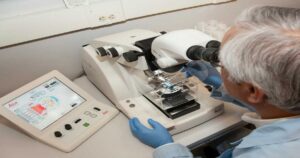Since ChatGPT’s launch in November 2022, artificial intelligence (AI) tools have become disruptive to nearly every industry. While there’s been controversy about whether AI would benefit the healthcare industry, it has proven to be just as capable in healthcare as in other sectors.
In the medical field, there is reason to believe AI tools may be an even more reliable and useful resource than other sectors. Medical students have been panicking over AI’s threat to their career prospects. But as these systems mature, the experts increasingly believe that AI may serve as a counterpart to human medical expertise rather than a threat.
How AI Tools Are Expected to Aid Medical Professionals?
Again and again, as the debate over modern AI tools rages on, we encounter the analogy of the calculator. No one feels threatened by calculators, not even professional mathematicians. Instead of throwing up their hands, math experts embrace the power of these now archaic computerized devices. If the experts are correct, this may be similar to the future of the alliance between AI and humans.
According to the designers and programmers who understand how these systems work as well as how information technology tends to progress, AI can be expected to help the medical profession in the following ways:
Cosmetic Surgery Consultations
One of the farthest-reaching applications we see develop is in consultations for plastic surgery and similar applications. Perhaps one of the easiest aspects to understand is hair-loss consultations. In our practice, we use a device known as HairMetrix, which uses an AI-driven analytical system to help determine what is causing a patient to lose their hair and which treatment options would be the most effective.
Because it is AI-driven, it is fully based on visual scans and is completely non-invasive. Just like this, AI can be used in an abundance of other ways to minimize the use of exploratory surgery and improve healthcare outcomes.
Improved Diagnostics
Artificial intelligence is already helping medical providers deliver diagnoses more quickly. These tools can identify anomalies that might otherwise take human hours or even weeks to identify. This has improved the rate of cancer detection, among other things, which will predictably improve survival rates.
Developing New Pharmaceuticals
The development of new medicines is notoriously slow. Not only is testing a painstaking process, but even seeking FDA approval can take years. AI is expected to help the development of pharmaceuticals through simulation on the molecular level, allowing researchers to see how the active mechanisms in a drug will work in the body.
Improved Administrative Efficiency
In the medical field, administrative tasks are notoriously slow. It is believed that generative AI will be able to automate many administrative functions and innumerable office chores. It could streamline sorting patient files, accelerate the interpretation of data, and much more.
Patient Access
In an area where information technology is already improving patients’ lives, access to medical advice is still a bottleneck in the system. AI tools have the potential to slowly bridge the gap in health disparities. Combined with the power to diagnose, this could dramatically increase the capability of online patient portals.
Of course, this list of anticipated AI capabilities is far from exhaustive. Researchers and medical professionals have high hopes for these tools, and some are already proving to be more than mere speculation.
In a world where AI is reshaping industries at an unprecedented pace, the healthcare sector stands poised to benefit significantly from this technological revolution. From streamlining administrative tasks to revolutionizing diagnostics, the potential of AI in medicine is vast and diverse. As we witness AI-enabled tools like HairMetrix, enhancing the cosmetic surgery consultations and AI algorithms expediting diagnostic accuracy, it’s clear that we are only at the beginning of a healthcare transformation that is set to improve patient care, increase survival rates, and revolutionize medical practices.



